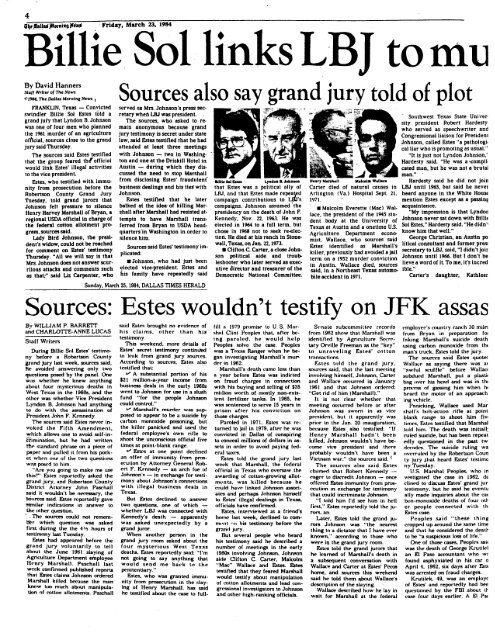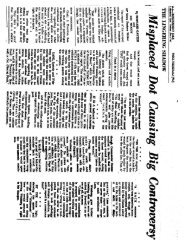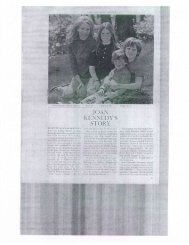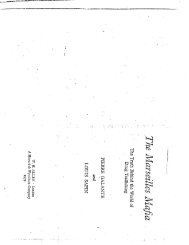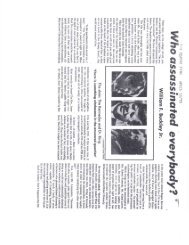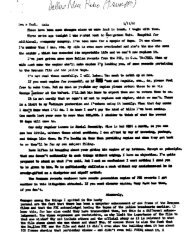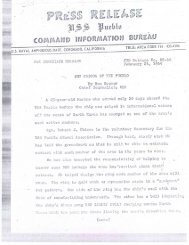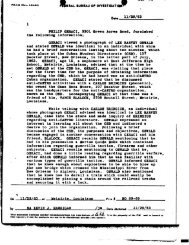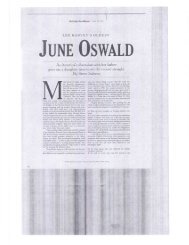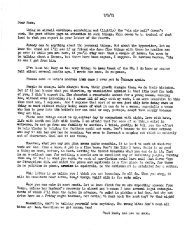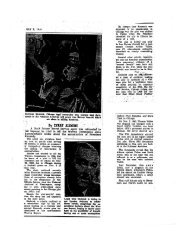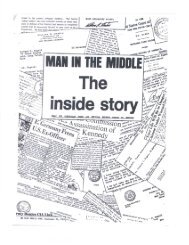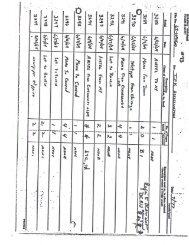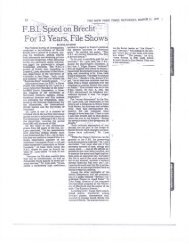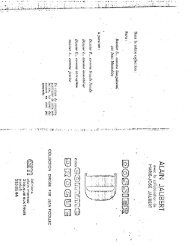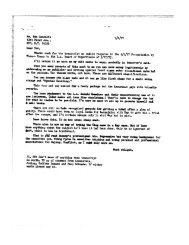coverups! - The Harold Weisberg Archive
coverups! - The Harold Weisberg Archive
coverups! - The Harold Weisberg Archive
Create successful ePaper yourself
Turn your PDF publications into a flip-book with our unique Google optimized e-Paper software.
4<br />
Glhe /Balla% Plorniva Phu, Friday, March 23, 1984<br />
Bll<br />
•<br />
Sl links<br />
i ie o LBJ to mu -<br />
By David Hanners<br />
Stall Writer of <strong>The</strong> News<br />
01984, <strong>The</strong> Dallas Morning News<br />
FRANKLIN, Texas — Convicted<br />
swindler Billie Sol Estes told a<br />
grand MO that Lyndon B. Johnson<br />
was one of four men who planned<br />
the 1961 murder of an agriculture<br />
atheist, sources close to the grand<br />
jury said Thursday.<br />
<strong>The</strong> sources said Estes testified<br />
that the group feared thiofficial<br />
would link Estes' illegal activities<br />
to the vice president.<br />
Estes, who testified with immunity<br />
from prosecution before the<br />
Robertson County Grand Jury<br />
Tuesday, told grand jurors that<br />
Johnson felt pressure to silence<br />
Henry Harvey Marshall of Bryan, a<br />
regional USDA official in charge of<br />
the federal cotton allotment program,<br />
sources said.<br />
Lady Bird Johnson, the president's<br />
widow, could not be reached<br />
for comment on Estes' testimony<br />
Thursday. "All we will say is that<br />
Mrs. Johnson does not answer scurrilous<br />
attacks and comments such<br />
as that:" said Liz Carpenter. who<br />
Sources also say grand jury told of plot<br />
served as Mrs. Johnson's press secretary<br />
wheil LBJ was president. .<br />
<strong>The</strong> sources, who asked to remain<br />
anonymous because grand<br />
jury testimony is secret under state<br />
law, said Estes testified that he had<br />
attended at least three meetings<br />
with Johnson — two in Washington<br />
and one at the Driskill Hotel in<br />
Austin — during which they discussed<br />
the need to stop Marshall<br />
from disclosing Estes' fraudulent<br />
business dealings and his dee with<br />
Johnson.<br />
Estes testified that he later<br />
balked at the idea' of killing Marshall<br />
after Marshall had resisted attempts<br />
to have Marshall transferred<br />
from Bryan to USDA headquartersin<br />
Washington in order to<br />
silence him.<br />
Sources said Estes' testimony implicated:<br />
• Johnson, who had just been<br />
elected vice-president. Estes and<br />
his family have repeatedly said<br />
Hillis Sol Estes Lyndon IL Johnson<br />
that Estes was a political ally of<br />
LBJ. and that Estes made repeated<br />
campaign contributions to LII4J's<br />
campaigns. Johnson assumed the<br />
presidency on the death of John F.<br />
Kennedy, Nov. 22. 1963. He was<br />
elected in 1964 to a full term, but<br />
chose in 1968 not to seek re-electint<br />
He died at his ranch in Stonewall,<br />
Texas, on Jan. 22,1973.<br />
• Clifton C. Carter, a close Johnson<br />
political aide and troubleshooter<br />
who later served as executive<br />
director and treasurer of the<br />
Democratic National Committee.<br />
Henry Manisa!! Malcolm Wallace<br />
Carter died of natural causes in<br />
Arlington (Va.) Hospital Sept. 21,<br />
1971.<br />
• Malcolm Everette (Mac) Wallace,<br />
the president of the 1945 student<br />
body at the University of<br />
Texas at Austin and a onetime U.S.<br />
Agriculture Department economist.<br />
Wallace, who sources said<br />
Estes identified as Marshall's<br />
killer, previously had avoided a jail<br />
term on a 1952 murder conviction<br />
in Austin. Wallace died, sources<br />
said, in a Northeast Texas automobile<br />
accident in 1971.<br />
Southwest Texas State Univers<br />
sity president Robert Hardesty<br />
who served as speechwriter and<br />
Congressional liaison for President<br />
Johnson, called Estes "a pathologic<br />
cal liar who is promoting as usual."<br />
"It is just not Lyndon Johnson,'<br />
Hardesty 'said. "He was a -compli.<br />
cated man, but he was not a brutal<br />
man." '<br />
Hardesty said he did not Join<br />
LBJ until 1965, but said he nevet<br />
heard anyone in the White House<br />
mention Estes except as a passinE<br />
acquaintance.<br />
"My impression is that Lyndon<br />
Johnson never sat down with Billit<br />
Sol Estes," Hardesty said. "He didn',<br />
know him that well."<br />
George Christian, an Austin po<br />
litical consultant and former press<br />
secretary to LBJ, said, "I didn't jolt<br />
Johnson until 1966. But I don't be<br />
lieve a word of it. To me, it's incred<br />
ible."<br />
Carter's daughter, Kathleer<br />
Sunday, March 25, 1984, DALLAS TIMES HERALD<br />
Sources: Estes wouldn't testify on JFK assas<br />
By WILLIAM P. BARRETT<br />
and CHARLOTTE-ANNE LUCAS<br />
Staff Writers<br />
During Billie Sol Estes' testimony<br />
before a Robertson County<br />
grand jury last week, sources said,<br />
he avoided answering only two<br />
questions posed by the panel. One<br />
Was whether he knew anything<br />
about four mysterious deaths in<br />
West Texas in the 1960s, and the<br />
other was whether Vice President<br />
Lyndon B. Johnson had anything<br />
to do with the assassination of<br />
President John F. Kennedy.<br />
<strong>The</strong> sources said Estes never invoked<br />
the Fifth Amendment,<br />
which allows one to avoid self-inaimination,<br />
but he had written<br />
the standard phrase on a piece of<br />
paper and pulled it from his pocket<br />
when one of the two questions<br />
was posed to him.<br />
"Are you going to make me use<br />
this?" Fates reportedly asked the<br />
grand jury, and Robertson County<br />
District Attorney John Paschall<br />
said it wouldn't be necessary, the<br />
'Sources said. Estes reportedly gave<br />
similar indications in answer to<br />
the other question.<br />
<strong>The</strong> sources could not remember<br />
which question was asked<br />
-first during the the 41/2 hours of<br />
testimony last Tuesday.<br />
Estes had appeared before the<br />
grand jury voluntarily to tell<br />
about the June 1961 slaying of<br />
Agriculture Department employee<br />
Henry Marshall. Paschall last<br />
week confirmed published reports<br />
that Estes claims Johnson ordered<br />
Marshall killed because the man<br />
knew too much about manipulation<br />
of cotton allotments. Paschall<br />
said Estes brought no evidence of<br />
his claims, other than his<br />
testimony.<br />
This weekend, more details of<br />
Estee secret testimony continued<br />
to leak from grand jury sources.<br />
According to sources, Estes also<br />
testified that:<br />
1/ A substantial portion of his<br />
$21 million-a7year income from<br />
business deals in the early 1960s<br />
went to Johnson for use in a slush<br />
fund "for the people Johnson<br />
could control."<br />
i•-•• Marshall's murder was supposed<br />
to appear to be a suicide by<br />
carbon monoxide poisoning, but<br />
the killer panicked and used the<br />
federal employee's awn rifle to<br />
shoot the unconscious official five<br />
times at point-blank range.<br />
(e" Estes at one point declined<br />
an offer of immunity from prosecution<br />
by Attorney General Robert<br />
F. Kennedy — an arch foe of<br />
Johnson's — in exchange for testimony<br />
about Johnson's connections<br />
with illegal business deals in<br />
Texas.<br />
But Estes declined to answer<br />
two questions, one of which -<br />
whether LBJ was connected with<br />
Kennedy's death — apparently<br />
was asked unexpectedly by a<br />
grand juror.<br />
When another person in the<br />
grand jury room asked about the<br />
four mysterious West Texas<br />
deaths, Estes reportedly said: "I'm<br />
not going to say anything that<br />
would send me back to the<br />
penitentiary."<br />
Estes, who was granted immunity<br />
from prosecution in the slaying<br />
of Henry Marshall, has said<br />
he testified about the case to full-<br />
fill a 1979 promise to U. S. Marshal<br />
Clint Peoples that, after be-<br />
ing paroled, he would help<br />
Peoples solve the case. Peoples<br />
was a Texas Ranger when he began<br />
investigating Marshall's mur.<br />
der in 1962.<br />
Marshall's death came less than<br />
a year before Estes was indicted<br />
on fraud charges in connection<br />
with his buying and selling of $35<br />
million worth of mostly non-existent<br />
fertilizer tanks. In 1965, he<br />
was sentenced to serve 15 years in<br />
prison after his conviction on<br />
those charges.<br />
Paroled in 1971. Estes was returned<br />
to jail in 1979, after he was<br />
convicted in Dallas of conspiring<br />
to conceal millions of dollars in assets<br />
in order to avoid paying federal<br />
taxes.<br />
Fates told the grand jury last<br />
week that Marshall, the federal<br />
official in Texas who oversaw the<br />
awarding of cotton-growing allotments,<br />
was killed because he<br />
could have linked Johnson associates<br />
and perhaps Johnson himself<br />
to Fates' illegal dealings in Texas,<br />
officials have confirmed.<br />
Estes, interviewed at a friend's<br />
home last week, declined to corn-<br />
merit his testimony before the<br />
grand jury.<br />
But several people who heard<br />
his testimony said he described a<br />
number of meetings in the early<br />
1960s involving Johnson, Johnson<br />
aide Clifton C. Carter, Malcolm<br />
"Mac" Wallace and Estes. Estes<br />
testified that they feared Marshall<br />
would testify about manipulation<br />
of cotton allotments and lead congressional<br />
investigators to Johnson<br />
and other high-ranking officials.<br />
Senate subcommittee records<br />
from 1962 show that Marshall was<br />
identified by Agriculture Secretary<br />
Orville Freeman as the "key"<br />
to unraveling Estee cotton<br />
transactions.<br />
Estes told the grand jury.<br />
sources said, that the last meeting<br />
involving himself, Johnson, Carter<br />
and Wallace occurred in January<br />
1961 and that Johnson ordered:<br />
"Get rid of him (Marshall)."<br />
It is not clear whether that<br />
meeting occurred before or after<br />
Johnson was sworn in as vice<br />
president, but it apparently was<br />
prior to the Jan. 20 inauguration,<br />
because Estes also testified: "If<br />
Henry Marshall hadn't been<br />
killed, Johnson wouldn't have become<br />
vice president and there<br />
probably wouldn't have been a<br />
Vietnam war," the sources said. (<br />
<strong>The</strong> sources also said Estes<br />
claimed that Robert Kennedy -eager<br />
to discredit Johnson — once<br />
offered Estes immunity from prosecution<br />
in exchange for testimony<br />
that could incriminate Johnson.<br />
"I told him I'd see him in hell<br />
first," Estes reportedly told the jurors,<br />
an.<br />
Later, Estes told the grand jurors<br />
Johnson was "the nearest<br />
thing to a dictator that I have ever<br />
known," according to those who<br />
were in the grand jury room.<br />
Estes told the grand jurors that<br />
he learned of Marshall's death in<br />
a subsequent conversation with<br />
Wallace and Carter at Estes' Pecos<br />
home, and sources this weekend<br />
said he told them about Wallace's<br />
description of the slaying. •<br />
Wallace described how he lay in<br />
wait for Marshall at the federal<br />
employee's country ranch 30 mile:<br />
from Bryan in preparation fot<br />
faking Marshall's suicide death<br />
using carbon monoxide from the<br />
man's truck, Estes told the jury.<br />
<strong>The</strong> sources said Estes quotes<br />
Wallace as saying there was at<br />
"awful scuffle" before Wallace<br />
subdued Marshall, put a plastii<br />
bag over his head and was in the<br />
process of gassing him when he<br />
heard the motor of an approach<br />
ing vehicle.<br />
Panicking. Wallace used Mar<br />
shall's bolt-action rifle at point<br />
blank range to shoot him fly'<br />
times, Estes testified that Marshal<br />
told him. <strong>The</strong> death was initiall:<br />
ruled suicide, but has been repeat<br />
edly questioned in the past tw<br />
decades. <strong>The</strong> suicide ruling wa<br />
overruled by the Robertson Coun<br />
ty jury _that heard Estee testimc<br />
ny Tuesday.<br />
U.S. Marshal Peoples, who in<br />
vestigated the case in 1962, de<br />
dined to discuss Estes' grand jut<br />
testimony, but he said he eventu<br />
ally made inquiries about the cat<br />
ben-monoxide deaths of four oth<br />
er people connected with th<br />
Estes case.<br />
Peoples said "these thing<br />
cropped up around the same time<br />
and that he considered the death<br />
to be "a suspicious toes of life."<br />
One of those cases, Peoples sail<br />
was the death of George Krutilel<br />
an El Paso accountant who v.q.<br />
found asphyxiated in his car o<br />
April 4, 1962. six days after Este<br />
was arrested on fraud charges.<br />
Krutilek, 49, was an employe<br />
of Estes' and reportedly had bee<br />
questioned by the FBI about th<br />
case four days earlier. A El Pal


